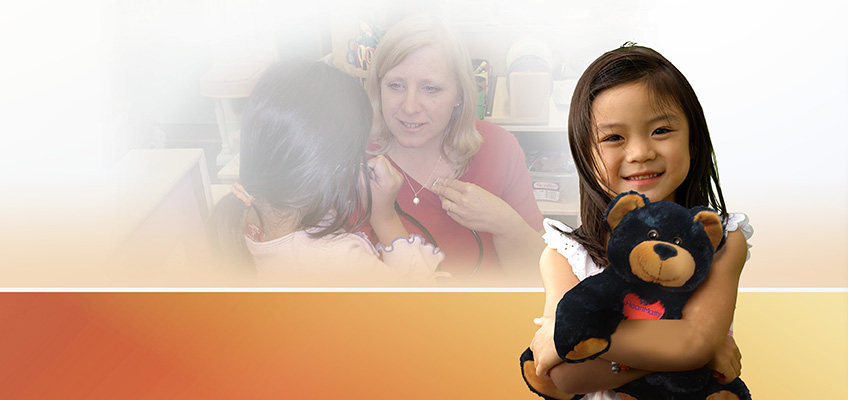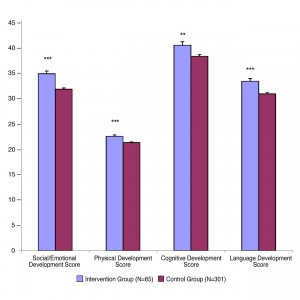
Researchers at the HeartMath Institute announced recently the results of a study in which children in 19 preschools within the Salt Lake City School District participated in the Early HeartSmarts program. Click here to review abstract and research paper.
Earlier this year the HMI newsletter carried a story about the Salt Lake City schools program and study, Facilitating Emotional Self-Regulation in Preschool Children: Efficacy of the Early HeartSmarts Program in Promoting Social, Emotional, and Cognitive Development. The study's purpose was to determine the effectiveness of Early HeartSmarts (EHS) in helping teachers "to guide and support young children in learning emotional self-regulation and key age-appropriate socio-emotional competencies, with the goal of facilitating their emotional, social and cognitive development."
As previously reported, HMI officials were pleased and encouraged with the results of the intervention program, which was conducted in the 2006-07 school year.
Researchers noted in the study summary that "the strong, consistent pattern of positive results observed across all analyses is compelling evidence of the efficacy of the EHS program (tailored for ages 3-6) in significantly facilitating development growth in preschool children, both overall, as measured by the total development scale, and also in each of the four dimensions of development measured… social/emotional development, physical development, cognitive development and language development."
The study whose lead author is Dr. Raymond Bradley concludes, "One of the most important points to emphasize in this conclusion is that these results are for preschool children — very young children, 96% of whom were between 3.0 to 4.0 years old. It is both striking and remarkable that children as young as 3 can learn, retain and practice the socio-emotional skills they were taught in the EHS program and actually facilitate an increase in their rate of psychosocial development."

Researchers, educators and other professionals have gathered substantial evidence, especially over the last decade, clearly establishing that an essential part of early childhood development is the acquisition of socio-emotional skills. The Institute of HeartMath's own extensive research into the physiology of emotions and longtime focus on education led to the development of the Early HeartSmarts program.
The study cites prior research conducted by HMI and others in which they concur with the research community regarding the critical nature of socio-emotional skills.
"This accords with research in psychophysiology which shows that learning effective emotion regulation techniques can significantly enhance attention, memory recall, comprehension, reasoning ability, creativity, and task performance in adults and children," the study notes.
The ages of 3 to 6 is a period of "maximal neurological growth and psychosocial development," the study explains. Therefore it is likely learning and sustained use of socio-emotional regulation skills during this period will readily instantiate a new set-point in the young child's brain for an optimal pattern emotional self-regulation which significantly boosts the long-term development trajectory of future psychosocial growth.
Yet as fundamental as emotion is to all aspects of psychosocial development, our educational system remains woefully deficient in teaching children effective strategies for understanding and regulating their feelings and emotions. In general, there is an almost exclusive focus on teaching children purely 'academic' skills without providing education in the socio-emotional foundations underlying the development of the very cognitive capacities required for academic performance. This is exacerbated by the problem that a disturbing number of children come to school ill-equipped, lacking the basic socio-emotional skills needed to learn and get along with others within a school setting.
Research and discussion topics of Early HeartSmarts intervention study
- Emotional Regulation in Early Childhood
- Psychophysiology of Emotional Regulation
- Role of the Heart in Emotional Experience
- Emotions Are Reflected in the Heart's Rhythms
- Psychophysiological Coherence — A State of Optimal Function
- Intentional Generation of Psychophysiological Coherence
The study concludes that the effectiveness of the Early HeartSmarts intervention in Salt Lake City shows that schools that adopt programs incorporating social and emotional learning into their curricula will generate benefits on multiple levels.
Establishing this key set-point early in the child's life, when neural connectivity is still highly malleable, and then sustaining it throughout the educational process with programs building on these fundamental skills, sets the child on a life course of health, well-being and achievement.
"Correspondingly, the integration of programs designed to foster socio-emotional competence into educational curricula — beginning at preschool — should prevent manifestation of much of the psychosocial dysfunction and pathology that not only robs individuals of a fulfilling life but also is an enormous cost to our society."
Essence of Early HeartSmarts
The Institute of HeartMath designed the Early HeartSmarts program, which has been reviewed and piloted by preschool teachers, administrators and early childhood experts, to facilitate emotional awareness and the psychosocial growth of children ages 3 to 6. The primary objectives of EHS is to give these children knowledge and skills to develop key social and emotional competencies that are known to facilitate their psychosocial development. Teachers are trained to guide and support children in this process.
The program teaches young children:
- how to recognize and better understand basic emotional states
- how to regulate emotions
- ways to strengthen the expression of positive feelings
- ways to improve peer relations
- skills for problem-solving.
View the research paper, Facilitating Emotional Self-Regulation in Preschool Children: Efficacy of the Early HeartSmarts Program in Promoting Social, Emotional, and Cognitive Development.

